
"Remember: our life does not turn on trivialities, but on the stars."
My, I can see I unleashed a little firestorm with my last post on James Dickey. A debate has arisen concerning Dickey's view of the poet's status in the universe. Does Dickey think he's superior to others, or not?
First, I think I may have done Dickey a disservice, posting that speech without providing relevant commentary. I'd like to provide some now, although I will admit, I'm dealing with some pretty heavy material in my studies of Agee, Wright, Bly and Dickey, some big thoughts that I haven't managed to completely wrap my mind around yet. Which is probably why I didn't include commentary on the Dickey speech in the previous post: I hadn't absorbed it yet. In other words, without being quite aware of what I was doing, I was posting Dickey's words so I could truly see them and reflect on them. I hadn't considered they could actually offend my readers' sensibilities.
Second, I think it's important to reveal at this time that I came to Dickey through reading James Wright's letters. Some of you recall that I took a river journey this past summer which lasted two months. One of the stops on the journey was Martins Ferry, Ohio, where Wright was born. I took Wright's collection of poems with me on the trip and bought Wright's letters when I returned home, after seeing the letters reviewed in The New Yorker. Wright's and Dickey's correspondence intrigued me. I was impressed at the volume of the letters they produced and at the quality of thought in them. I recently found the collection of Dickey's letters on Amazon and have just started reading them.
Third, Dickey's letters come to me at a time when I've been searching for what it means to be an artist. Those of you who have been following my blog know that I've been wrestling with my thoughts on writing and the creative life the whole time I've been blogging. I'd been wrestling with these thoughts much longer than that. At least now I've decided that I am indeed "an author," but what does that mean? What is the artist's relationship to the world? To understand the role of the artist, I've been avidly reading what artists have had to say on the matter.
My point of intersection with Dickey is in how he viewed the poet's work as a divine act. In my reading of Wright, Dickey, Bly, and Agee, I've come to understand they were very serious about their art. Wright, Dickey, and Agee were troubled men. They all drank heavily and suffered all manner of depression, alienation, and heartache. I don't think it would be exaggerating to say it was poetry that gave these men the only sense of freedom they had ever known. They were not religious in the conventional sense, but they felt the divine through their art. It's frankly quite amazing to me that I could have anything in common with these hard-living, driven men. I once thought my attitude of art's connection to the divine was feminine or soft. Seeing the attitude expressed through a strong male figure like Dickey shows me my thinking was wrong.
For these men, the poetic consciousness gave them a faculty through which to perceive the spiritual world. It gave them, they thought, an inkling into a world of "Divine Wisdom"--the world of the Sophia. Their work looked into the darkness, and, like Novalis, they saw in this darkness the great mystery of life. Their art was their way of overcoming death because through their art, they believed they had tapped into something eternal.
Novalis was a German poet living at the end of the 1700s. He had a spiritual vision at the grave of the woman he was to marry, and in this vision he came to understand the value of darkness and the mystery of life. Novalis wrote:
...then, out of the blue distances, from the hills of my ancient bliss, came a shiver of twilight, and at once snapt the bond of birth, the fetter of the Light. Away fled the glory of the world, and with it my mourning; the sadness flowed together into a new, unfathomable world.
I think Dickey, Wright, Bly, and Agee also had this vision. They may have experienced it in a different way than Novalis did, but their insights were hard won through a series of falls, sufferings, and finally a kind of resurrection through their art. Certainly, Dickey and the others were drawn to poets like Novalis, de Nerval, Neruda, Trakl, and Vallejo, poets who had entered this darkness either through suffering or madness, sometimes both.
This, I think, is what Dickey means when he says the poet is elevated. This poet-seer, through art, has access to the great mysteries of life, what Dickey refers to as "the secret." It's this mystery that Dickey elevates above the trivialities of culture, the schlock culture, along with its "general icons." It may help to know that Dickey worked in advertising for a while in order to pay the bills. In one letter, in fact, he draws a distinction between a Coca Cola ad he was working on and Shakespeare. Coca Cola is a general icon. Coca Cola is schlock. It isn't on the same plane as Shakespeare, or de Nerval, or Novalis. Coca Cola is not divine, in Dickey's view.
"Away fled the glory of the world," Novalis wrote. In other words, Novalis had seen "the secret" and nothing could compare.
To further illustrate what Dickey may have meant by poets being "up there" and general icons being "down there," consider something that Wright wrote to Robert Bly: "You know, I sometimes try to escape the thought, but it returns and returns and returns: that some day I shall rise at morning and simply walk outside and away, leaving everything behind, like Buddha. Yes, I shall be killed by a runaway checkbook or an insane life-insurance policy by the time I get two blocks from home."
I speak of Wright, Bly, and Dickey almost interchangeably because they were poets during the same time and were great friends who corresponded about art over a long period. They helped sharpen each other's thoughts. Wright made the comment about Buddha and life-insurance, but Dickey could just as well have. The runaway checkbook and the insane life-insurance policy are those killing forces Dickey was talking about. They are "down there," that is, trivial considerations compared to "the secret."
In Dickey's own work, his poetry and his fiction, we see a that mystery being played out through encounters with nature. Deliverance is the example most people will remember. In that novel, the river is a force that humans seek to "beat" or to "control." But Dickey believed the mystery could not be controlled, and only those who didn't understand the mystery sought to control it. Humans try to put themselves above the mystery, or "the secret."
At the beginning of this post, I included a quote from one of Wright's letters, a letter he wrote to a despairing friend. Wright and Dickey wrote many such letters to poet friends, letters of encouragement.
Wright wrote to his friend: "Remember: our life does not turn on trivialities, but on the stars."
I think this is what Dickey was saying.
There's poetry in everything. A poem isn't just a series of words, lines, or stanzas on paper. The river is poetry; a potato is poetry. A tree, a rock, the sky, a crow, a mermaid, the turkey shit my mother used to spread on her garden (which, by the way, she said was "like gold.") If you could read Dickey's letters, and Wright's, I think you'd see the absolute humility they had when it came to their role as artists. They were in complete awe of poetry and felt their inadequacies acutely.
I hope I've clarified a few things for my wonderful friends and readers. Like I said, I've only begun to scratch the surface of these mysteries myself. The picture of Jesus is one I've posted before, back on my AOL blog. It was posted on one of the first entries I did. When I posted that picture of Jesus so long ago and called it "My Writing Life," I had only the vaguest notion of what the implications of that picture were. I think I'm getting closer to understanding what "My Writing Life" does indeed mean. Bear with me as I continue my search.



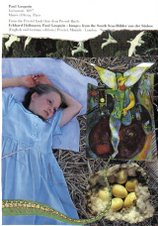


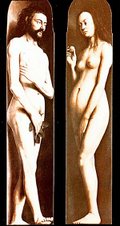

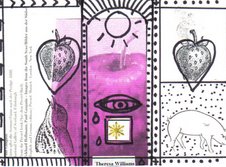
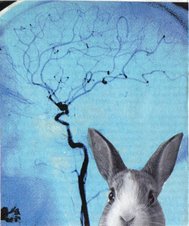
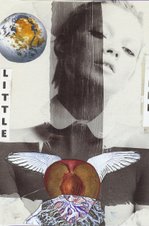
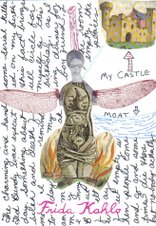
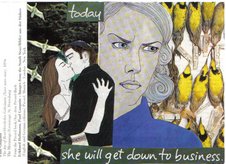

8 comments:
I remember the painting, Theresa. Beautiful in its brilliance.
This is a wonderful piece of writing, and explains so much more about Dickey and his friends. Thank you. Here is the quote that struck me most vividly: "Humans try to put themselves above the mystery, or 'the secret.'" Yes, and that is the enormous mistake we are making today. I totally agree that there is a mystery, and maybe the poets are closer than most to it - but the good news is that if we lay down our arms, we can all be poets in our own way.
I love your explication here, my dear. And that quote from Novalis is magnificent, and chilling, and profound. Thank you for all of it. There is much to think about as I head off to bed.
"I think I'm getting closer to understanding what "My Writing Life" does indeed mean. Bear with me as I continue my search."
These two sentences could have come from my mouth. (And the picture of the Sacred Heart...I have no words, as yet.) I have ALWAYS equated my writing with my life. Always. Always have, and always will.
I might, upon reflection, have changed the words I quoted above to "understanding what my writing life currently means" as I suspect it will always change, be fluid. But my writing life is deadly serious to me and thus my obsession lately with the dead seriousness of the written word.
We writers/artist/poets experience lives of constant, complete, unending rejection. If we did not believe our lives and our purpose and our words had honor, we could not survive. This doesn't mean we believe we are better than anyone else (on the contrary, we are too well aware of our shortcomings and limitations...) only that we MUST believe in our purpose, that our words and our lives have meaning, that they carry, and convey, importance.
All of you have become my "James Dickey" in that these blogs have become our letters. We write out our thoughts about what it means to write and our place within society.
Artist, by nature are seek crowds to stand on the edge of them observe, I think. How can I gleam good material if I don't watch for it? Sure, I live it too but some of the things must be seen with my own two eyes.
For example, I do not have to loose my own child to write a pretty convincing short story about loosing one. I do however; have to know something about loss. I think that when artist come together and discuss the processes and their points of views it only serves to sharpen the effectiveness of them all.
And I repeat, you each have become my "Dickey" but I refuse to be like Hemingway. In fact I am hoping that you will save me from me. From the despair of feeling alone...imagine if these men had had way to communicate instantly like this back then.
Imagine how many readers come to read your thoughts and are changed now.
I am a poet. No amount of denial has ever changed that simple fact about my soul. When I see the world I think in poems. Proof? I wrote that poem about the Sea of Cortez in my car, in my head on my way to work. I changed three words.
But this does not make me divine, it makes me sometimes hopeless...and distracted. It makes it hard for me to concentrate on accounting.
I think I am done hijacking your blog.
xxoo
Re. "their insights were hard won through a series of falls, sufferings, and finally a kind of resurrection through their art"-
"But what I was going to say is that I do feel strongly that among the greatest pieces of luck for high achievement is ordeal. Certain artists can make out without it, Titian and others, but mostly you need ordeal. My idea is this: the artist is extremely lucky who is presented with the worst possible ordeal which will not actually kill him. At that point, he's in business. Beethoven's deafness, Goya's deafness, Milton's blindness, that kind of thing. And I think that what happens in my poetic work in the future will probably largely depend not on my sitting calmly on my ass as I think, 'Hmmm, hmmm, a long poem again? Hmmm,' but on being knocked in the face, and thrown flat, and given cancer, and all kinds of other things short of senile dementia. At that point, I'm out, but short of that, I don't know. I hope to be nearly crucified."
John Berryman
“A poem has secrets that the poet knows nothing of.”
Stanley Kunitz
Oh my- Now we have this lush list of poets and their secrets to relish-
Thank you-
Gretchen
This is an excellent entry, Theresa. So much to digest! So much to consider! I love the relationship that these writers had, and I was especially struck by the quote, "Remember: our life does not turn on trivialities, but on the stars." I'll read this again later on, certainly. Thank you for all the fuel!
What you've written makes me wish I were a student in one of your classes. What a wonderful professor you surely are.
As always, I've found much to think about here (and that's a good thing).
Judi
Thank you for posting this - I'm going to have to read more deeply, but I wanted to share an initial reaction.
I'm sure it's an intentional juxtaposition that you have Joan of Arc and Dickey in the sequential postings. From what I know of Christian mysticism, which admittedly isn't much, the search for the Eternal brings one to a separate place from those who aren't searching. Similarly, the poet's search for her own Eternal brings her to a higher place.
I guess I shall contrast that with Hassidic Jewish mysticism. When Rabbi Israel ben Eliezer, who was known as the Baal Shem Tov (Master of the Good Name), spoke of his particular brand of mysticism, he spoke more of a unification of the lower and upper worlds, by elevating this world and the people in it.
So is there a conformal mapping, then, that a poet has the duty in the secular community that a tzaddik has in the Jewish community, that of elevating those around him or her? Perhaps, but again, this is colored by the differences in the focus of the mystical experience.
The tzaddik tries to teach his congregation that there are sacred sparks in EVERYTHING, and what makes something worthy or worthless is how it is used. Thus it may be so for writing, although I'm hard-pressed to see what can be elevating about Stephen King :-)
Theresa, I want to write about the runaway checkbook. I'm not sure I understand what this means -- oh, maybe I do, to me -- but I liked that image. What if the runaway checkbook is the obverse of the coin with the secret? Well, that's just a thought that came to me. What if they are not opposites but are...partners? That's how I've come to think of life and death, not as opposites, but as partners (I know that's simple). Well, just food for thought. The post, and the comments, were energizing to read. Beth
Post a Comment